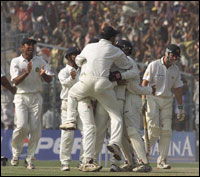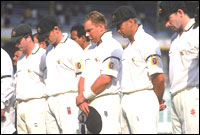Disaster spelt India's comeback
Daniel Laidlaw
Australia's tour of India began with considerable amount of speculation and anticipation. After thrashing an inferior West Indies team at home in an unprecedented season of dominance, it was hoped the tour of India would provide an accurate measure of Australia's standing. After dominating meek opponents, the prospect of seeing Australia confronted by a vastly different
team willing to attack was a thought to relish.
The tour was surrounded in uncertainty because it pitted Australia's recent
invincibility in a setting in which it had not tasted victory for 32 years.
The consensus of Aussie opinion seemed to be that Australia would triumph
1-0, with the belief that India might prepare flat pitches to blunt
Australia's pace attack and that high-scoring draws would ensue.
 There was little warning of what was in store. After India's defeat inside
three days in the series opener in Mumbai, the first Test was written off as
an Australian walkover. In reality, it was just as gripping as the
subsequent two and in dispute for the majority of its relatively brief
duration. It will be remembered in history as merely the disaster that made
India's comeback all the more meritorious, but had Australia claimed the
series, it would have been recalled for the breathtaking and match-winning
partnership between Matthew Hayden and Adam Gilchrist that precipitated a
series triumph.
There was little warning of what was in store. After India's defeat inside
three days in the series opener in Mumbai, the first Test was written off as
an Australian walkover. In reality, it was just as gripping as the
subsequent two and in dispute for the majority of its relatively brief
duration. It will be remembered in history as merely the disaster that made
India's comeback all the more meritorious, but had Australia claimed the
series, it would have been recalled for the breathtaking and match-winning
partnership between Matthew Hayden and Adam Gilchrist that precipitated a
series triumph.
On a pitch that turned appreciably, Steve Waugh made the bold decision to
insert the opposition and pursue the plan of attacking the home team with
pace. It paid off, as India was rolled for 176 and Australia was positioned
to take command of the series after just one day. But in the first of what
were to be continual dramatic turns in play, Australia plunged to 5/99 and
the fatal prospect of conceding a first innings lead loomed.
Enter Gilchrist. In a situation that apparently called for a desperate scrap
for survival, Australia's dynamic No. 7 played an innings of stunning
fearlessness, essaying risky sweeps with emphatic effect. In conjunction
with Hayden, who likewise employed the sweep with a savage consistency that
had India in shock, Gilchrist rescued the match as Australia registered an
improbable 173-run first innings lead.
 Despite those batting fireworks, the enduring image of the first Test was
Ricky Ponting's sprint and full-length dive to hold a catch at mid wicket to
dismiss Tendulkar after the ball rebounded from Langer's shoulder at short
leg. There was no indication that this kind of fortune, smiling so serenely
on the tourists while they took the initiative, was about to savagely turn
against them.
Despite those batting fireworks, the enduring image of the first Test was
Ricky Ponting's sprint and full-length dive to hold a catch at mid wicket to
dismiss Tendulkar after the ball rebounded from Langer's shoulder at short
leg. There was no indication that this kind of fortune, smiling so serenely
on the tourists while they took the initiative, was about to savagely turn
against them.
Having severely shaken India's misplaced pre-series confidence with victory
No. 16, the second Test proceeded along the same lines as the first as the
possibility of another remarkable whitewash came in to focus. Hayden,
impervious to all bowlers, fell three runs short of consecutive Test
centuries. He guided Australia to a superb start only for it to crumble to
Harbhajan, before Steve Waugh seemingly set up a historic victory with an
emotional hundred on one of his favourite grounds.
At that time, Waugh must have felt that India was not such a daunting
environment after all. He might have considered the fact that Australia had
not won there for three decades a mere statistical anomaly. It was still
Test cricket and Australia was still playing like the mighty juggernaut that
had swept most before it. Then one man changed all that and showed how
fragile Australia's hold on the series really was.
Although Harbhajan Singh won the series with 32 wickets, Laxman was the
catalyst behind the great comeback. There was little the Australians could
do to stop him. Despite the signs, initially it was not believable that
Laxman and Dravid were changing the course of the match, simply due to the
sheer number of runs they had to score and the fact India had collapsed in
the midst of a potential comeback in the first Test. By tea on day four,
though, confirmation had set it in that the revival was indeed genuine, and
that Australia had a dangerously confident opponent on its hands.
Forced into the alien position of having to bat for a draw, an anathema to
Australia in recent times, the Australians batted like they could not accept
victory was out of reach, something Ganguly had gone to great lengths to
ensure by delaying his declaration.
What followed was the first of two collapses responsible for losing the
series. If Harbhajan had proven his ability with a hat-trick and 7 wickets
in the first innings, then he introduced his match-winning qualities in the
second with a further six. A series of poor shots brought the crowd into the
game, swung the momentum to India, and saw the series remarkably levelled at
1-1.
Managing to put the demoralising shock of Kolkata behind them, the tourists
began the third Test with a stunning degree of confidence, putting 140 runs
on the board by lunch on day 1. Hayden turned an excellent series into a
record one as Australia reached 3/326, a position from which it again should
have controlled the match. Squandered opportunities were becoming a theme,
however, as the second of the catastrophic collapses ensued that would
ultimately cost the Aussies the series.
If there was any proof required of how the series had turned full circle, it
came on day 3. Tendulkar, in ominous form on 82, mishit Miller to deep mid
wicket only for Slater, running in from the boundary, to spill the chance by
leaping at the ball in celebration before it reached him. The contrast
between Slater's dropped catch and Ponting's opportunistic diving snare in
Mumbai could not have been starker. India held the ascendancy and the
Aussies could not even accept regulation opportunities. A heroic fightback
with the ball that almost snatched an impossible victory ensured the series
would live long in the memory, but victory was destined to be India's.
After such a draining Test series, the one-dayers were an unwelcome
inconvenience in the way of a much-needed rest. Viewed from any angle, a
successful one-day series could do nothing to make up for the heartbreak of
the Test loss. At least it allowed Australia to finish the tour on a
positive note, breaking the loss-win-loss-win sequence to register
consecutive victories at the end of the series and maintain it's one-day
reputation.
A jaded Australia faltered under the pressure of a chasing a large target in
Bangalore, came back in Pune thanks to Mark Waugh's hundred, then found
itself 2-1 down in Indore after conceding 299 runs and suffering a massive
batting reversal. A record total courtesy of Hayden's first ODI hundred and
a return to form by Ponting then won the fourth game to level the series
2-2. Originally scheduled to fly home, Matthew Hayden was belatedly included
in the one-day squad and simply continued his form, batting with equal
assurance in one-dayers to be Australia's undisputed hero of the tour.
After making a promising start in pursuit of India's 265 in the deciding
match, a negative feeling of déjà vu began to take hold midway through
Australia's chase. As the extra batsmen were made redundant by perishing
cheaply, it seemed Australia would follow the trend of its tour and succumb
once again. But to the credit of a calculating Bevan and Ian Harvey, they
stood firm and broke the pattern of capitulation. The spirit shown in
defying the trend, more than an inconsequential one-day series victory
itself, made it a heartening conclusion to a failed tour.
You can also read:
Australia's deficiencies were exposed
Series Overview: Australia | India
Mail Daniel Laidlaw